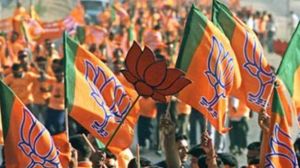Taking French connection beyond wine 038; cheese
I am in Paris to speak at the second conference on India organised by the Indo-French Association AFUI, being held at the French Senate un...

I am in Paris to speak at the second conference on India organised by the Indo-French Association AFUI, being held at the French Senate under the patronage of its President, Christian Poncelet. This is the second time that I would be speaking to a distinguished audience of Senators, business representatives and a diverse segment of the French society. The conference is designed to look at India in a composite way from the viewpoint of economic progress, technological changes, cultural roots, legal framework and even the Bollywood world. So what are broadly the opportunities and constraints in furthering Indo-French relations, particularly those arising from new economic opportunities? Relations have in the recent past not suffered any serious political irritants. The impression that we have not adequately reciprocated their support on a wide range of issues like membership of the Security Council or non-ostracising following the nuclear tests needs correction.
Mechanisms like round table conferences, strategic dialogue and visits of political dignitaries from both sides have helped mutual understanding. Nonetheless, economic engagement remains tentative. French businessmen are influenced by a positive coverage of India in financial and economic spheres and want an India presence or upgraded exposure, but cannot fully get over their initial hesitation. The hangover of past anecdotal irritants must be put to rest. The investment community, banks and financial institutions need aggressive engagement. Consider the following:
On bilateral trade, while France is our 5th trading partner among the EU countries, our total trade is just over US 2.3 billion with exports from India being US 1.2 billion while imports are just over 1 billion. Only 2.3 per cent of our global exports which itself is rather small go to France and only 1.3 per cent of our total imports are sourced from them. India8217;s share in France8217;s global imports is 0.45 per cent lower than even our low share of global trade. On investment, the numbers are equally small. The total approved Foreign Direct Investment FDI from France is US 1.72 billion, which is just 3 per cent of the FDI approved from all countries. Actual flows are also at just 3 per cent.
The initiation of strategic dialogue with France was a qualitative gain. Outcome in the economic spheres however remains opaque, but then one must not unmask the mystique of strategic dialogues. Shorn of mystique they would be so mundane! Here are some suggestions:
The total number of Indian students who annually secure admission in France is just 500. Compare this to 15,000 for the UK and 70,000 for the USA! An important barrier is language. The French government has extended the reach and penetration of Alliance Francaise in India. This may not be enough. Universities need to undertake special programmes for imparting language skills and corporate sector and bodies like CII need to support through scholarship programmes. We have resumed the acceptance of French assistance after a short, ill-thought-out interruption. These resources can partly fund language progammes. Increase in the number of Indian students in French Universities has multiplier benefits. On investment opportunities in India, clearly, there is scope for much greater expansion. Interminable delays like aircraft acquisition, submarine or Mirage purchases add to the discomfort.
While inter-firm and inter-company awareness in France continues to be weak, there is an expanding scope in sectors like energy, particularly power and nuclear energy, water management to name a few. With depleting fossil fuel-based energy and given India8217;s demographic and development compulsion for high energy needs, dependence on nuclear energy has considerable advantages. In the short run, seeking enhanced French cooperation for increasing nuclear energy availability is high priority. In the medium term, no doubt, we need to harness thermo-nuclear energy as discussed at the recent EU Summit. A 100,000 MW of availability from nuclear later thermo-nuclear sources may sound ambitious but would make a qualitative difference to our development process. The joint working groups must finalise some tangible projects, preferably with French equity or as joint ventures, since in several areas, particularly power and atomic energy, public sectors are either nodal or dominant.
In agriculture, the moderation of high subsidies would make France an attractive market for Indian farm products. There are converse opportunities as well. The French, notwithstanding competition, have retained their reputation in wine cultivation. However, duty on wine continues to be a punitive 180 per cent adding both central and state levies. Moderate wine drinking, particularly of red wine, is receiving favourable health reviews. Duty moderation, apart from benefiting Indian consumers, would create a climate for joint ventures in wine cultivation in areas where soil conditions are favourable.
On agro-processing, the multiplicity of our food laws will inhibit any investor. It does not help if Perrier water consumed in over 130 countries is declared as contaminated in India! A group of ministers constituted two years ago to draft a food legislation is still deliberating. More than the laws themselves the debate is about who should enforce the laws8212;food inspectors are not reconciled to losing this high rent seeking territory.
If India needs to wake up, so do the French. French banks like BNP Paribas or Societe Generale are nowhere near matching the aggressiveness of their American counterparts to grasp opportunities in private banking including retail banking. Similarly, in areas like automobile or auto ancillary, consumer durables, mining and metallurgy, the scope available to the French industry remains grossly under-utilised. Indian corporates are aggressively seeking acquisitions abroad to synergise their existing operations or diversify product and process activities. France offers interesting possibilities for Indian corporate investment.
Prof Raymond Barre, the former French prime minister, at a meeting of ASPEN France enquired from me as to when the rush of Indian students to the trans-Atlantic shores would abet to enable Europe to secure a fair share of professionals. Security concerns would limit access to the US and a saturation point with the UK may soon be reached. We must diversify our linkages and seek new opportunities. The French can help us, and in the process help themselves, by making it less onerous for Indian professionals to secure work permits. Fortunately, positive developments in India have not gone unnoticed and number of joint projects in the pipeline could reach a critical mass in the near future. Indo-French relations must look beyond culinary delights8212;wine 038; cheese, or curry 038; biryani. Just like 8216;nouveau-cuisine8217; is a fusion cuisine where we re-adapt our food habits, the dimensions of our relations must re-adapt to the new economic realities.
write to nksinghexpressindia.com
- 01
- 02
- 03
- 04
- 05































